Meet the 2023-24 CSO/CCM Diversity Fellows
by DiDi Turley
The CSO/CCM Diversity Fellowship is a rare gem in the world of training opportunities for pre-professional musicians. Since its launch in 2016, the Cincinnati Symphony Orchestra’s (CSO) partnership with the University of Cincinnati College-Conservatory of Music (CCM) and the Andrew W. Mellon Foundation has boosted the careers of more than 30 musicians from underrepresented backgrounds in the orchestral field.
The program was conceptualized to work against an issue that is top-of-mind for progressive orchestral leaders across the industry. That question is one of equity. How can orchestras have a hand in removing the barriers that underrepresented groups face when seeking to pursue a career in this field?
Through the Diversity Fellowship, the CSO has found a way to move the needle of diversity in symphony orchestras at the national level. Musicians from underrepresented populations are invited to get their foot in the door of a top American symphony orchestra in a specialized two-year program created with the intent of breaking down the systemic barriers of cost, exclusion and access to training and networking opportunities.
CSO/CCM Diversity Fellows perform frequently with the CSO and are given access to invaluable training opportunities. These include mentorship from members of the CSO, mock auditions, funding for travel to auditions and a full tuition scholarship to either the Master of Music (MM) or Artist Diploma (AD) programs at the elite CCM, along with stipends and compensation for their work with the CSO.
Keep reading to meet this year’s cohort of Diversity Fellows and learn about their musical journeys leading up to their time in Cincinnati.
Wendell Rosa | Double Bassist | Brazil | Artist Diploma Candidate at CCM
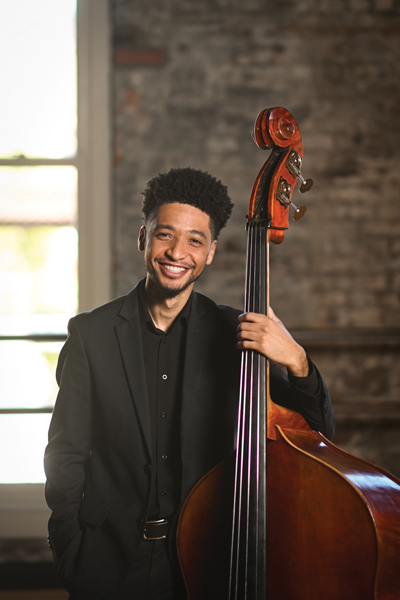 How did you come to start playing your instrument?
How did you come to start playing your instrument?
Like many musicians, I started in church, playing with my dad. My dad was a guitar player, and he taught me how to play electric bass so that I could play with him at the church. Later, when I was 16 years old, I started to play double bass in a social project in my hometown.
Why are programs like the Diversity Fellowship important to you and other musicians?
I’m a student who has never paid for his education, and I’m incredibly thankful for that. It’s so important for musicians to have a way to live and learn from great musicians and access other opportunities that allow them to become better musicians, regardless of their financial status. Musicians all come from different financial backgrounds, and programs like this one allow all of them to learn from great musicians and be a part of the world of classical music. Programs like these are really changing the classical music scene for the better.
What does your self-care routine as a musician look like?
It’s a very hard balance to find because the work we do is both psychologically and physically stressful (with an instrument like the bass). Finding a space to also take care of yourself is very important. I usually don’t go beyond what I can take. I won’t let myself practice more than my attention span allows me to. I allow myself time to take care of myself. I’ll watch a good show or go to the gym, walk and talk with friends. It’s important to just take time to not do anything so that I can be energized to go back and practice properly.
What changes do you hope to see in the world of professional orchestras in the coming years?
I think that we are already living in a changing period for the industry. I think Cincinnati is a good example of that, with the amount of diversity that they have in their programming and on stage. In the future, I would like to see more of different ethnicities as full-time musicians in orchestras around the United States and around the world. I think that there are many talented and hard-working people out there who just need the opportunity.
Manuel Papale | Cellist | Argentina | Artist Diploma Candidate at CCM
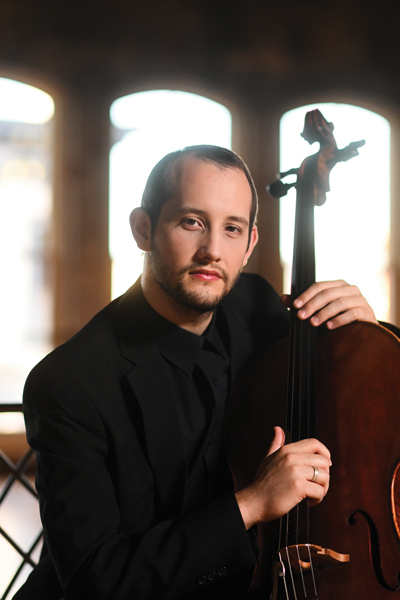 How did you come to start playing your instrument?
How did you come to start playing your instrument?
I started playing music when I was 10. I actually started with guitar—I found my grandfather’s classical guitar under my brother’s bed and started learning it from there. I auditioned for a performing arts school not long after that, but they only accepted jazz guitarists. They let me into the strings program, though, and that’s when I got started on cello (because it looked the most like a guitar).
What attracted you to apply to the Diversity Fellowship?
Well, I already knew about the CSO and their really stellar programming—it’s really unique. I was at Indiana University at the time, and my girlfriend, who lived near Cincinnati and is a percussionist, would come to see the CSO every week. She let me know about the Fellowship, and eventually, my roommate and I went to see them play Mahler Symphony No. 2, and it was amazing. After the concert, I had a chat with one of the bassists in the Orchestra and he let me know that he had been a part of the Fellowship. Now he’s a full-time member of the Orchestra. At that point, I decided that it was something I had to try.
How has being in the Diversity Fellowship affected you so far?
I’ve always loved playing in an orchestra. That was my first real passion, but I’d heard so much about the challenges of landing a job and, to me, it felt insurmountable. I felt like I had so much catching up to do as someone—one of many—who came up in musical programs that didn’t provide us with all of the tools we needed to succeed in this field. This program is, in a lot of ways, helping me to catch up, and it’s giving me the tools and encouragement to go for it.
If you could play one other instrument in the orchestra, what would it be?
Does conducting count? I’m just so fascinated by conductors. They’re forced to be such scholars and they get to know so much repertoire and work with so many different ensembles. What they do has always been really intriguing to me.
Melissa Peraza | Violist | Venezuela | Master of Arts Candidate at CCM
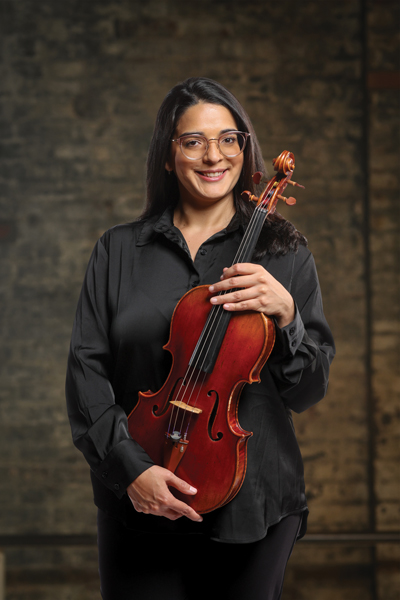 How did you come to start playing your instrument?
How did you come to start playing your instrument?
I grew up as a student in El Sistema, which is a social program in Venezuela that works to get young people involved with music lessons and play in orchestras.
The person that got me into it was my stepfather—he is a very important figure in my life. I started on viola, which is a little unusual. It’s pretty weird to be a “true” violist, or someone that started out on the viola instead of switching to it later on.
What attracted you to apply to the Diversity Fellowship?
My former teacher at the University of Southern Mississippi is an alumna of CCM and she was very influenced by my current teacher at CCM, so she told me about this program from the beginning of my studies in Mississippi. In my last year of that program, we started working on my audition for the Diversity Fellowship, and I was accepted.
Why are programs like the Diversity Fellowship important to you and other musicians?
Programs like this one are important because they give opportunities to international students—especially those who may not come from a certain financial background. It means everything to be able to learn what you need to do to get into a professional orchestra. That’s my biggest dream. It’s not just about the financial help, but also the ways you grow as a musician. You get to learn how the people won their jobs, how they like it, and everything that they’ve had to keep up with to stay in these positions. It’s something that we’d never have the opportunity to learn without this program.
What does your self-care routine as a musician look like?
I’m actually working on that right now! It’s a hard thing to balance. I’ve been working to appreciate the progress I’ve made. I’ve been working on taking time to rest and spend time with friends without feeling guilty about it. It’s definitely still something that I’m working on, but it’s such an important thing. I also listen to a lot of Brazilian music! I really like salsa and I love to dance. It’s very relaxing for me.
What changes do you hope to see in the world of professional orchestras in the coming years?
Definitely more diversity. It feels like we’re doing so much in this program, but we don’t always see that change across the entire industry, you know? I hope that starts to change in the following years. It’s definitely something that I see as a slow process, but I hope we get there sooner rather than later, for sure.
Caleb Edwards | Double Bassist | United States | Artist Diploma Candidate at CCM
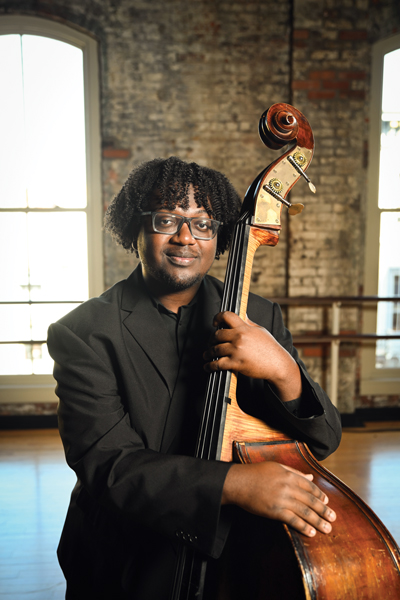 How did you come to start playing your instrument?
How did you come to start playing your instrument?
I’m originally from Birmingham, Alabama—I was born and raised there. When I was super young, I would go with my mom and my sister to their church’s choir rehearsal every week. I was too young to sing in the choir, so I’d sit behind the organist and have all the choir’s different parts going through my ears. I think that’s what really created my musical ear, I guess. I started playing piano in second grade and switched to the violin in third grade, and, in fourth grade, I finally started on double bass. My grandma was the one who really wanted me to switch to double bass because she always knew that I would be tall. She kept insisting that it would just work out as the best instrument for me.
What attracted you to apply to the Diversity Fellowship?
The Fellowship existed when I was here for my undergraduate degree, and the bass players I knew that were in the Fellowship all sounded amazing, but, even more than that, they were very uplifting and nice and down to earth. They would always help out the other bassists around them and encourage us. Being exposed to that at a very early stage in my career was just very inspiring. Then, looking at the opportunities that this Fellowship provides was amazing. The performance opportunities and the financial support and lessons are so important in the journey of a young, Black, Hispanic musician like myself.
Why are programs like the Diversity Fellowship important to you and other musicians?
With the systemic racism that we see in America, Black and Hispanic people haven’t always been given equal opportunities in classical music. I believe this Fellowship—and others like it—help supply opportunities to Black and Hispanic artists that we wouldn’t normally have. It’s encouraged me so much to apply for auditions and jobs, and it’s given me more confidence in my own career goals. It made me realize that I do have a place in this industry…that I have a seat at the table, and I can even make my own table if I need to.
If you could play one other instrument in the orchestra, what would it be?
Definitely the cello. It’s way easier to transport than the bass.
What changes do you hope to see in the world of professional orchestras in the coming years?
I most definitely want to see more diversity, especially in the programming. I want to see the larger orchestras programming a lot more Black and Hispanic composers. I also want to see more visible diversity on the stage and more orchestras going into inner city schools’ music programs to bring more musicians of color into the field. I want to see aspiring musicians of color being offered equal opportunities, despite their financial status.
Lucas Braga | Violinist | Brazil | Artist Diploma Candidate at CCM
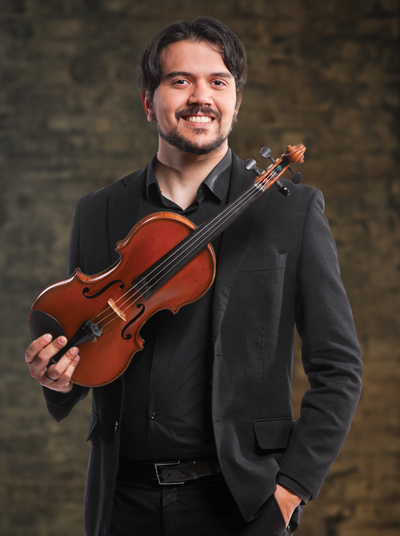 How did you come to start playing your instrument?
How did you come to start playing your instrument?
I’m from Sorocaba, which is a city like two hours from São Paulo in Brazil—around 700,000 people live there. We didn’t have an orchestra, so I actually started playing music in the church. My parents went to this church their whole lives; they met in the church. My dad was studying violin and my mom played the organ. The church offered free music lessons, so I started when I was like 9 years old. When I was 11, I went to the city conservatory where I was able to start studying more officially.
Why are programs like the Diversity Fellowship important to you and other musicians?
I feel like programs like this one have different advantages for different people. You know, I’ve played in orchestras my whole life, but playing at the high level of the CSO is a whole new experience. What I’m gaining the most, though, are the advantages of being around people who are already in a position that I aspire to. It’s a really great way to learn how to get there yourself. Having a direct line to the people that we all watch on stage and admire is so helpful to young musicians.
What has been your favorite performing experience in your career so far?
Something that made a big mark on my life was getting the chance to play as concertmaster for an orchestra in Pittsburgh. In January, I had just come back from Brazil, and one of my repertoire class teachers called me. She plays as concertmaster for a regional orchestra near Pittsburgh. Something had come up and she needed someone to step in for her the day before the concert. I had just arrived at the airport when she called me, so I went straight to the school, practiced the whole piece and stepped in for her the next day.
What does your self-care routine as a musician look like?
First, if I’m too tired or if I feel pain, I do not practice. I give myself time to rest and get in the right headspace because, for me, it’s better to rest sometimes instead of practicing without being fully present. Outside of music, I like to cook. I like to eat well. Whether I’m cooking or eating out, I get joy from good food.
What changes do you hope to see in the world of professional orchestras in the coming years?
Being at the CSO, you get to see all of the people who are putting effort into bringing diversity on stage. I feel that the biggest problem [in the industry] is that we don’t have enough orchestras making the same efforts. You know, I come from a poor family, so my mom only had music at church, and then she started going to my concerts because I’m playing in them. Before I started playing, she never felt like those concerts were a place for her. I feel that working toward a more diverse orchestra can help audiences realize that they deserve to be here. I want to see more orchestras inviting people in and telling them that they don’t have to show up in a tux. They can come as they are, and they can know that it doesn’t matter what they’re wearing or what car they arrived in or what they’re eating for lunch and dinner or if they buy expensive wine. It’s about the music.